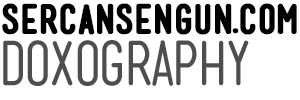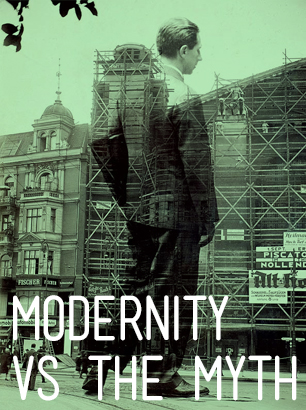Modernity vs The Myth
IS “THE MYTH” INHERENT IN US, COULD WE EVER LET GO OF IT?
Listening to and looking around us today, one could propose that humans are in a love and hate relationship with modernity. The promise of a blissful and elevated life, one that is more civilized and fair than we have lived in the previous ages, seems like a fading dream you just had before you woke up, that keeps getting harder and harder to remember by each passing minute. Reading the works of Alain Touraine [1] and Anthony Giddens [2], it is possible to dissect the term into many parts and scrutinize it, but the reality is, there is really nothing wrong with modernity. After all, it is something, we as humans, made up – then it should be us that are damaged goods.
So, how did then modernity got broken, contaminated and twisted, and became the much feared, and almost shunned-out concept of post-modernity? Or maybe the real question is, had there ever been a modernity out there in the first place?
For Giddens post-modernity itself is also an illusion, the thing we are talking about is actually a continuation of modernity, an inevitable consequence of what the humanity has gone through during the 19th and 20th century. His claim is that the transformations that humanity lived through these periods – both external and internal – is unlike anything that has ever been experienced in human history before. Even with all our accumulated knowledge from the previous ages, we have failed to understand the impact of these dramatic and profound changes, and maybe even today we are still at a loss. For Giddens the post-modernity is an illusion that corresponds to this feeling of being loss. Only after the modernity started to provide the tools for us to understand itself, then we started to see it for something else – for something that it really is or ourselves for something that we really are.
As much as Giddens seems disappointed in Lyotard [3] to invent the term, Touraine seems grateful for it. Giddens is a thinker who seems to never have believed in modernity in the first place. Touraine on the other hand adumbrates an affinity with the term, he seems to have had expectations from it and even feels glad that it wasn’t modernity itself that failed, but the rise of post-modernity that let it fell. Even when criticizing modernity he bases it on the modernist critique of Rousseau [4] [5]. In either case one thing is apparent; modernity failed us – or to be more precise, we failed modernity.
Why then should we take the blame for modernity’s fall, is there a lesson to be learned in the corruption of an age of enlightenment, or is it too late to backtrack? A possible answer arises in the most unlikely (or maybe the most likely) place; Slovaj Žižek’s work On Belief [6];
“[…] what is ‘postmodernism’ if not the ultimate defeat of the Enlightenment in its very triumph: when the dialectic of enlightenment reaches its apogee, the dynamic, rootless postindustrial society directly generates itw own myth.” (p.11)
What is this myth Žižek refers to, and how did it ever led to the downfall of enlightenment? Deriving from Žižek, one can conclude that myth is the prehistorical narrative, the unknown, the feared, the divine, the soul, the unrational, the intruding and atrocious imagination, the east, the primordial deity that keeps popping up whether we try to keep it down or not. It is impossible to get rid of it, yet in modernity it is also impossible to remain with it. It is what we cannot get apart with, it is what we brought with us into modernity, and it is what contaminated it to become the post-modern. Žižek quotes Heidegger [7] here and expresses Heidegger’s definition of the struggle – it is a contestation between east and west, the Greek breakthrough of the west versus the pre-philosophical mythical universe of east (Asia). The enemy (as in the enemy of the reason / enlightenment / modernity, that which will corrupt it and lead it to its downfall in the end) is “the mythical in general and the Asiatic in particular” (p.146).
Yet at this moment one should better turn to Lyotard, to understand this dilemma. The main problem between east and west, myth and rationality, modernity and post-modernity, seems to be lying in the core of epistemology. This is a conflict between the knowledge as a humanly engineered process and knowledge as a divine, mystic and mythical entity. It is the sentiment that leads us to believe that there is knowledge in the mystical and mythical, an ancient wisdom that we seem to be getting away from, undiscovered meanings in the ancient texts and people that we have somehow lost or forgotten with the modern. It is all these notions that keep surfacing and seemingly keeping humanity away from the rational, the humanly, the epistomology that is not contaminated with the myth. Going back to Žižek see how his definition of colonization fits this rendition;
“Colonization was never simply the imposition of Western values, the assimilation of the Oriental and other Others to the European Sameness; it was also the search for the lost spiritual innocence of OUR OWN civilization. This story begins at the very dawn of Western civilization, in Ancient Greece: for the Greeks, Egypt was just such a mythic place of the lost and ancient wisdom.” (p.68)
Even as the philosophy / enlightenment / pure mind emerged, the search for the mythical did not cease. At the moment of triumph for the human and the reason, the myth always seems to ooze its way in. Maybe even these lines is the mythical narrative of an age of reason lost, and I, as the author, is oblivious to the symbiotic life I lead with the myth. Žižek at this moment has a better quotation for the condition;
“The ultimate postmodern irony is thus the strange exchange between Europe and Asia: at the very moment when, at the level of the ‘economic infrastructure,’ ‘Euroean’ technology and capitalism are triumphing world-wide, at the level of ‘ideological superstructure,’ the Judeo-Christian legacy is threatened in the European space itself by the onslaugh of the New Age ‘Asiatic’ thought, which in its different guises […] is establishing itself as the hegemonic ideology of the global capitalism.” (p.12)
Of course there is a lot of satire and irony here. It would be misleading to deduce that Žižek is championing for the global capitalism or any ideological hegemony, but the allusion stands. His definition of Western Buddhism is nothing less than genious. It is the definition of the modern individual; the one that disdains the capitalism but at the same time cannot prevent himself to be a part of it, and the one that aspires to be modern but cannot extort his being from the myth. Because he got stuck in the myth, the modernity failed – because the modernity failed, he sank deeper into the myth. Thus he (the human) takes the enlightenment and the modernity and mythicizes it, grand-narrates it and inevitable pushes it into a state of post.
For Žižek, this state of the post is the culprit that procreates the much that results in the fall; “the libidal economy of the capitalist consuption” (p.21) that raises the need but never satisfies it, “the asymmetrical relationship of lack and excess” (p.22) that substitues for enjoyment (in reality he bases this in the interpretation of Lacan by Miller [8]) and “depriving the Self of any substantial content” (p.26) that results in isolation.
This brings us back to the original question of this short work; is the myth inherent in us, will there ever come a time that we will be able to let go of it. Also here is an additional one; are enlightenment, modernity and reason in themselves other myths that we are trying to cling to when the grand narrative of the previous ages failed us? The answer that was derived from this doxography is a pessimistic and depressive one. Yet it is my hope that the critique of modernity / enlightenment / reason presented here (if it was ever a critique of them and not of us in the first place) was not for the contestation of the terms but a scrutiny of why they have failed us / we have failed them. In return we may learn from the fall and aspire to get up and try to walk again.
[1] Touraine, Alain (1995). Critique of Modernity, trans. D. Macey. Blackwell, Oxford.
[2] Giddens, Anthony (1990). The Consequences of Modernity. Polity, Cambridge.
[3] Lyotard, Jean-François (1984). Post-modern Condition: A Report on Knowledge. University of Minnesota Press, Minnesota.
[4] Rousseau, Jean-Jacques (1994), Discourse on the Origins of Inequality. Oxford University Press, Oxford.
[5] Rousseau, Jean-Jacques (2002), The Social Contract: And, The First and Second Discourses. Yale University Press, New Haven.
[6] Žižek, Slovaj (2001). On Belief. Psychology Press, Oxford.
[7] Heidegger, Martin (1985). Schelling’s Treatise on Human Freedom. Ohio University Press, Athens.
[8] Miller, Jacques-Alain (2000). Paradigms of Jouissance in Lacanian Ink 17. Wooster Press, New York.



Leave a Reply
You must be logged in to post a comment.